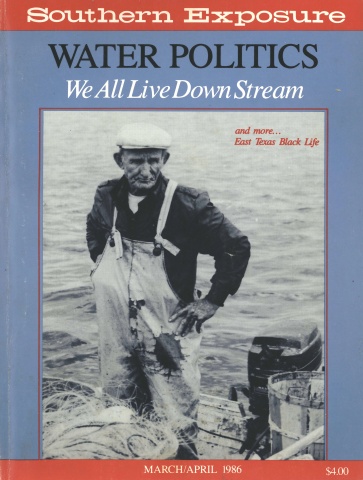Dixie Students Take a Stand

This article originally appeared in Southern Exposure Vol. 14 No. 2, "Water Politics." Find more from that issue here.
The 1960 lunch counter sit-ins begun by North Carolina A & T activists in Greensboro galvanized black college students across the South into a new, self-consciously styled "movement" for civil rights. Many focused their energies through the Student Nonviolent Coordinating Committee (SNCC).
Some of their white contemporaries, also swayed by the Earlier promise of Brown vs. Board of Education, joined SNCC and other wise took part in the cause. Anguished by the knowledge that their forebears had created the system of oppression, a core of young Southern white civil rights organizers found themselves cut off from family and friends because of this new activism.
By the end of 1963 SNCC had changed its orientation from campus to community organizing, and its goals moved beyond achieving civil rights to seeking economic parity. Southern whites within SNCC realized that the organization's increasing radicalism would alienate some white students who other wise could be drawn into civil rights work. The other major student organization, Students for a Democratic Society, had a far too national agenda to appeal to Southerners.
In April 1964 forty-five students from fifteen Southern white campuses gathered in Nashville to launch a new group, Southern Student Organizing Committee (SSOC). Determined that the "South could solve its own problems," they issued this manifesto:
We do hereby declare, as Southern students from most of the Southern states, representing different economic, ethnic and religious backgrounds, growing from birthdays in the Depression years and the war years, that we will here take our stand in determination to build together a New South which brings democracy and justice for all the people.
…[When] Franklin D. Roosevelt assumed the presidency of the U.S .... [he] called our Southland America's number one domestic problem." He talked about the needs of those Americans who were ill-housed, ill-fed, and ill-clothed. Today, in 1964, when a majority of our nation is living in an affluence which makes the spectres of poverty and racism tenfold more inexcusable, a Southerner is in the White House. Yet the struggle for equal opportunity for all men white and non-white, young and old, man and woman, is by no means completed. Our Southland is still the leading sufferer and battleground of the war against racism, poverty, injustice and autocracy. It is our intention to win that struggle in our Southland in our lifetime-tomorrow is not soon enough.
Our Southland is coming of age, they say. But we both hope and fear for her new industries and her new cities, for we also are aware of new slums, newly unemployed, new injustices, new political guile-and the Old as well. Is our dream of democracy to be dashed just as were Jefferson's dreams and the Populist struggles lost in the blend of feudal power, racial fear and industrial oligarchic opportunism? Only as we dare to create new movements, new politics, and new institutions can our hopes prevail.
We hereby take our stand to start with our college communities and to confront them and their surrounding communities and to move from here out through all the states of the South-and to tell the Truth that must ultimately make us free. The Freedom movement for an end to segregation inspires us all to make our voices heard for a beginning of a true democracy in the South for all people. We pledge together to work in all communities across the South to create nonviolent political and direct action movements dedicated to the sort of social change throughout the South and nation which is necessary to achieve our stated goals.
Our region must be an exemplar of the national goals we all believe in, rather than a deterrent to them:
1. Not only an end to segregation and racism but the rise of full and equal opportunity for all;
2. An end to personal poverty and deprivation;
3. An end to the "public poverty " which leaves us without decent schools, parks, medical care, housing, and communities;
4. A democratic society where politics poses meaningful dialogue and choices about issues that affect men's lives, not manipulation by vested elites;
5. A place where industries and large cities can blend into farms and natural rural splendor to provide meaningful work and leisure opportunities for all-the sort of society we can all live in and believe in.
We, as young southerners, hereby pledge to take our stand here to work for a new order, a new South, a place which embodies our ideals for all the world to emulate, not ridicule. We find our destiny as individuals in the South in our hopes and our work together as brothers.
Among the legacies of the SSOC is Southern Exposure. In 1970 two SSOC leaders founded the Institute for Southern Studies, designed as a think tank to research and publicize political and economic issues in the South. 1he Institute began publishing Southern Exposure in 1973.